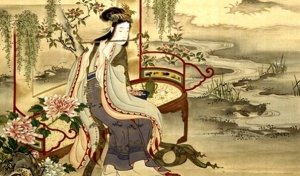7 Amazing Chinese Proverbs

A lot of Chinese proverbs are literally “age-old.” Some of them were made up for their own sake, and other ones come from legends. They all have the same goal teaching a condensed life lesson. It’s an educational way of transmitting the wisdom collected by that culture over the centuries.
The word Chinese word for these proverbs is “Chengyu.” Almost all of these sayings are made up of four characters in Chinese. It’s an ideographic language, so every character has a wide range of meanings.
“A motionless dragon in deep waters becomes a prisoner to the crabs.”
-Chinese proverb-
If there’s one thing that characterizes Chinese proverbs it’s their elegance. That and their poetic ability to make metaphors for reality. They’ve lasted so long and spread to so many cultures all over the world. Now we’re going to share seven great examples of these wonderful proverbs with you.
Chinese proverbs about willpower
Asians, and especially Chinese people, have been characterized as having a deep sense of sacrifice and giving a huge value to willpower. These people have historically gotten through colossal natural disasters and risen out of their ashes multiple times. That’s why they give such a huge value to the ability to stay strong. This is how they put it: “Great souls have wills; feeble ones have only wishes.”

And there are a lot of Chinese proverbs that highlight the ability we all have to shape our own destiny. Here’s one way they put it: “You cannot prevent the birds of sadness from passing over your head, but you can prevent their making a nest in your hair.”
Mountains and life
Mountains are a metaphor a lot of Chinese proverbs use. They represent hardship and obstacles. Here’s one example with this saying: “The person who moves a mountain begins by carrying away small stones.” This quote pays a tribute to patience, which is a source of strength in Asian cultures.
There’s another proverb with a similar idea: “You must climb the mountain like an old man to arrive like a young one.” They also talk about patience here, along with perseverance. You climb the mountain like an old man, that is, you confront the obstacle slowly and wisely. “To arrive like a young one” means that the path will rejuvenate the person who walks it.
The true meaning of trust
There’s a Chinese proverb that says: “The best kind of locked door is that which you can leave open.” This is a beautiful lesson with a lot of truth to it, and it’s wrapped in a nice poetic bow. The proverb is talking about trust.

In this case, the door is a symbol for a defensive person. They give themselves security and prevent entry to something valuable. But you can’t put your trust in that barrier, only in other people’s desire not to cross it.
Excessive purity
The pure and impure have always been common topics in religion, philosophy, and culture. We almost always associate purity with positivity and impurity with negativity. But this Chinese proverb flips that idea around: “No fish can live in absolutely clear water.”
This reflection talks about the lack of humanity in perfection. That’s why we call water with no life in it “sterile.” Where there is life, though, there is also a contradiction. That is, what there is is “impurity.” But it’s the kind of wonderful impurity that is the root of all life. Let’s not forget that the right answers come from the wrong ones, not from perfection.
Move forward, always move forward
The Chinese, like most Asian cultures, are lovers of a pause. Unlike Western culture, they see a weakness in being in a hurry, not a strength. Even just the creation of their history has lasted multiple centuries. They’re role models of slow change. This saying sums up that point of view nicely: “Be not afraid of going slowly, be afraid only of standing still.”

In this case the saying talks about how important it is to stay active. But this doesn’t necessarily mean being completely dynamic. It’s more like a process that moves forward step by step. Even if the goal is far away, as long as you keep moving forward you’ll get there.
Chinese proverbs are an endless source of wisdom and beauty. The loveliest thing about them is that special way they have of implying things, without saying them directly. They invite each one to reflection, instead of giving out a “prepackaged” absolute truth. And that’s exactly why they’re so magical.
This text is provided for informational purposes only and does not replace consultation with a professional. If in doubt, consult your specialist.








